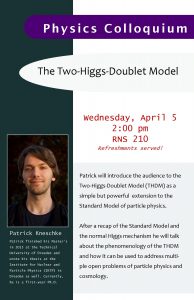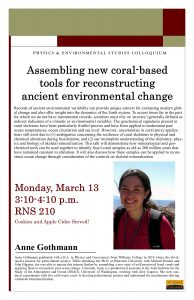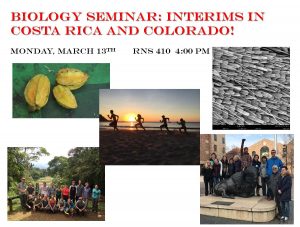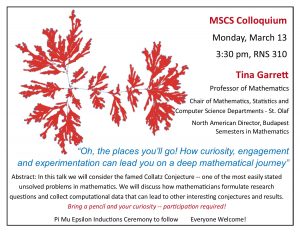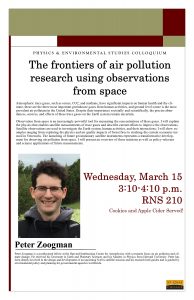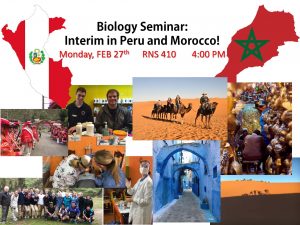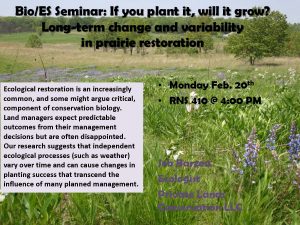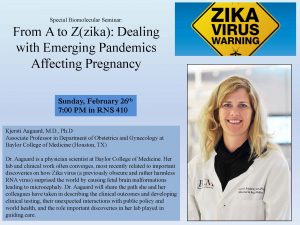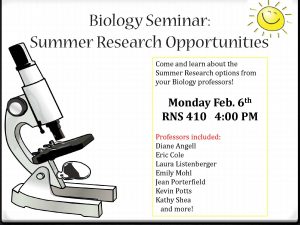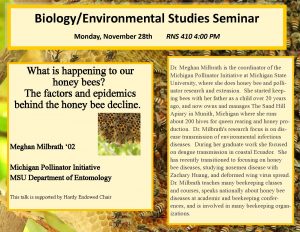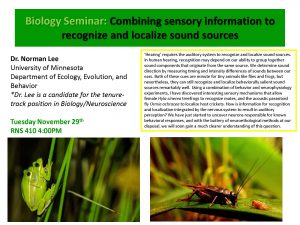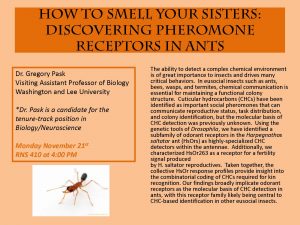Monday, February 15
MSCS Colloquium: When less is more: mathematical models explain surprisingly low parasitism rates for a Finnish wasp.
Katie Montovan,assistant professor of mathematics at Bennington College in Vermont.
Imagine you are a wasp that parasitizes butterfly eggs, and that you have found a cluster of 200 host eggs that are ready and not parasitized. Why would you choose (or evolve genetic behavior) to parasitize less than all of the eggs? This is a puzzling question, but add to it that the wasp avoids previously parasitized clusters and the motivation seems downright bizarre. In this talk, I will develop a set of plausible reasons it might be better for the wasp, Hyposoter horticola, to parasitize only a third of each host egg cluster it encounters. I will then explain how we used mathematical models and field and lab studies to test each hypothesis and rule out all but one theory in order to explain this behavior.
3:15 cookies and conversation, 3:30 Colloquium, RNS 310
Tuesday, February 16
MSCS Research Seminar: Using mathematical modeling to understand animal behavior.
Katie Montovan,assistant professor of mathematics at Bennington College in Vermont.
Mathematical modeling, simulation, and analysis are valuable tools for answering biological questions about evolution, self-organization, and complex ecosystem interactions. For each biological question the appropriate mathematical tools must be carefully employed in order to produce meaningful results. In this talk I will present several of my recent projects to illustrate the process of taking a biological problem and making it into a mathematical one, the mathematics used to answer the question, and the biological meaning of the results. I will discuss self-organization in honeybees, evolved behaviors in parasitic wasps and potato beetles, and complex population dynamics in coral reef ecosystems.
1:30pm, RNS 206
Wednesday, February 17
Physics Seminar: Testing the Standard Model and Searching for the Dark Side Using Atomic Physics
Holger Müller, Assistant Professor of Physics, University of California, Berkeley
2:00 pm in RNS 210
MSCS Colloquium: Stochastic Population Dynamics.
Eric Eager, assistant professor at the University of Wisconsin – La Crosse.
Environmental and demographic stochasticity impact the dynamics of all biological populations. Environmental stochasticity, spatiotemporal fluctuations in life history originating from variability in factors such as precipitation, temperature and nutrient availability, generally acts similarly on individuals within similar age and/or stage classes. Demographic stochasticity, originating from the variability in demographic events such a survival, growth and reproduction, acts on similar individuals in different, unpredictable ways. While a complete analysis of population dynamics will acknowledge both sources of variability, different mathematical tools are needed to understand the effects of these distinct forms of stochasticity. In this talk we use various techniques from probability theory to study simple population models incorporating both environmental and demographic stochasticity.
3:15pm cookies and conversation, 3:30pm Colloquium, RNS 310
Thursday, February 18
MSCS Research Seminar: Modeling, Analysis and Simulation of a Stochastic Population Model for a Disturbance Specialist Plant Population and its Seed Bank.
Eric Eager, assistant professor at the University of Wisconsin – La Crosse.
Stochastic models are essential to understanding the population dynamics of plant species that use delayed reproduction to combat environmental uncertainty. One such species is wild sunflower (Helianthus annuus), which is a disturbance specialist plant – its seeds do not germinate in the absence of soil disturbance. These soil disturbances can be modeled as a stochastic process, which gives rise to a nonlinear stochastic integral projection model for the population density of H. annuus and its seed bank. In this talk I derive and analyze this model, and show that it predicts population dynamics that converge to an invariant probability measure either completely concentrated on the extinction state or completely excluding the extinction state. I will then show through simulation studies the sensitivity of this measure to changes to the soil disturbance profile.
11:30am – 12:30pm, RNS 206
Friday, February 19
No Seminars



